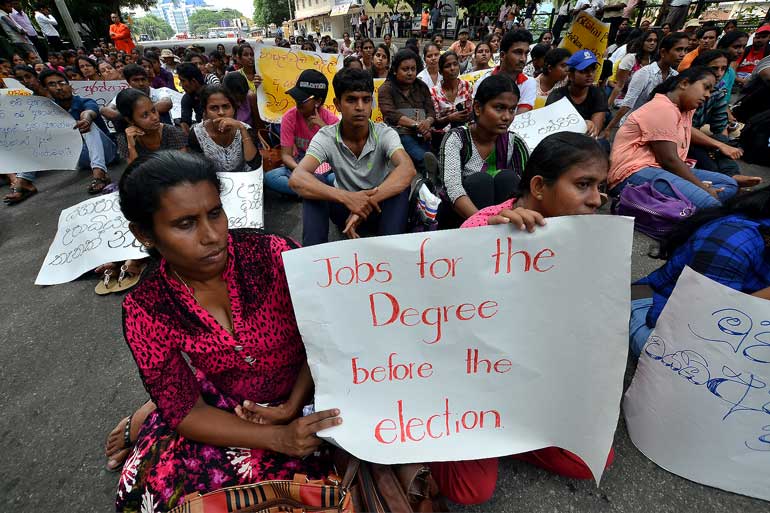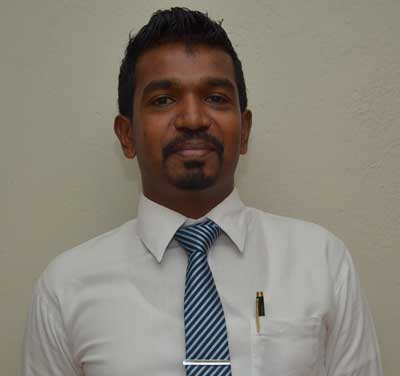Monday Feb 23, 2026
Monday Feb 23, 2026
Wednesday, 10 August 2016 00:00 - - {{hitsCtrl.values.hits}}

By Madura Thiwanka Pathirana
According to the Census and Statistics Department, the percentage of youth from the total population of Sri Lanka in 2012 was 23.2%, a decline compared to 2011. The National Human Development Report (2014) also indicates that distribution of youth within the provinces is uneven.
As a growing economy, Sri Lanka needs to focus more on service sector involvement. Higher involvement in the service sector will enable the economy to improve in every factor, for example in employment opportunities, higher disposable income, etc. For the growth of the Sri Lankan economy, the youth of the country needs to contribute to this higher involvement. This is currently not the  case (NHDR 2014).
case (NHDR 2014).
Youth who are based in the North, North Central and Eastern Provinces are contributing at a low level to economic development in the service sector. If policy developers can develop a solution to empower and enlighten the youth, their contribution would be higher.
The key reason behind this was discovered by analysing a sample industry and sample of youth. As a young entrepreneur, I always observe young entrepreneur-based companies who are engaged in service delivery. For this short review, I would like to discuss the Negombo-based tourism taxi service providers. Currently, these young service suppliers are moving away from the core benefit which the passengers are expecting from them. Service providers are instead resorting to manipulating and misleading the customer and maximising the revenue and net profit.
From the primary research which I carried out, I have found four main factors which service providers are implementing to generate high revenue and net profit, thus moving away from the core service delivery: adding hidden charges, aging fleet, inexperienced staff and charging extraordinary prices.
Strong knowledge-sharing process needed
If the educational sector can develop a strong knowledge-sharing process for the youth in this country, I believe young people will be more engaged in economic activities. As the NHDR (2014) indicates, if the country can focus on building an industry sector knowledge sharing program, with an advanced methodology with the intention of youth empowerment, engagement with a defined format will certainly rise.
The NHDR (2014) also indicated that the North and East Provinces are struggling to provide jobs to the youth. If private and Government sector education systems can integrate to design an approach aiming to reduce the lack of knowledge in economic activities, and if the education system can improve their knowledge of specialised economic activities in these areas, youth involvement will improve. This is the best solution; in the National Youth Survey (2013) 48.7% of the respondents mentioned that they would prefer a skilled job.
If economic engagement knowledge can be integrated with knowledge of job opportunities, youth engagement in the economy will be higher. The National Youth Survey states that 36.8% of youth reaffirmed the lack of information on job opportunities.
Due to the above identified factors, the industry and key service providers are struggling to cover the financial cost of the investment made for the vehicles. Return on the investments is decreasing with the rising investment costs. Survival of the individual operators is becoming a nightmare for most of the entrepreneurs; some of these companies are operating under a very small profit margin. During my research, which I was able to talk to few suppliers. They believe the only way to generate high revenue was through the manipulation of the service.
As a result, recently majority of the young service suppliers have become bankrupt and left the industry. They think that since the Government is not focusing on development of the tourism industry, they do not get adequate demand for their service. I don’t believe that this is the case. I think they entered the market due to lack of employment opportunities. But as they do not have adequate knowledge of the industry, they get a negative response from the market causing them to leave the industry. They do not have many employment opportunities in Sri Lanka, therefore majority of them have left the country to do minor jobs abroad.
Empowering the youth
What we can learn from this is that it is very important to empower the youth in the country with the right knowledge and adequate professional and industry experience. This will stop young people from entering the service sector without a clear and defined objective. This will also help the youth of Sri Lanka to aim higher and dream bigger than owning a three-wheeler and serving as a tour guide in the tourism industry.
If the policy developers can accept the reality of today’s youth and develop an affordable and focused solution specifically aimed at youth empowerment, we as a country can get the maximum benefit out of young people in the development of this nation.
(UNLOCKED is a space for Sri Lankan youth to express their views and opinions on development with the aim of creating positive change in the world. The views expressed in the blogs are solely those of the authors. UNDP Sri Lanka and Daily FT does not represent or endorse the views expressed in these blogs. Read more about the UNLOCKED initiative www.lk.undp.org.)
(The writer schooled in Anuradhapura Central College and graduated with an island rank at the GCE Advanced Level examinations. He is currently a senior lecturer for an international campus in Sri Lanka and Head of the Business Management Division. His first degree was obtained in 2011 from Staffordshire University UK and in 2015 he obtained an MBA from Cardiff Metropolitan University. In 2014 he started his own business based on the Sri Lankan travel and tourism industry. He is currently reading for a doctorate from the University of Wales. His many hobbies include conducting research on consumer behaviour, human behavioural pattern changes, strategic management and marketing management.)